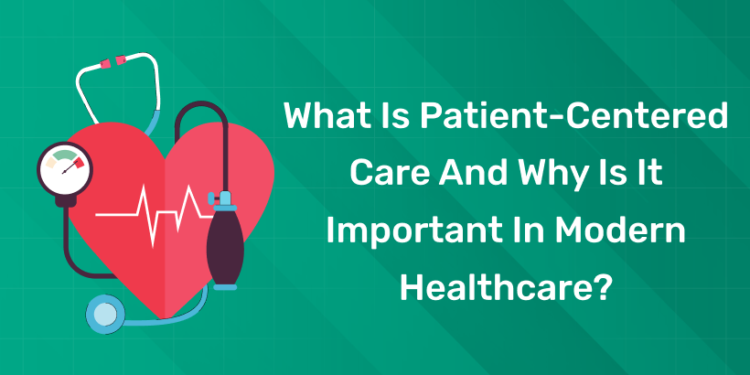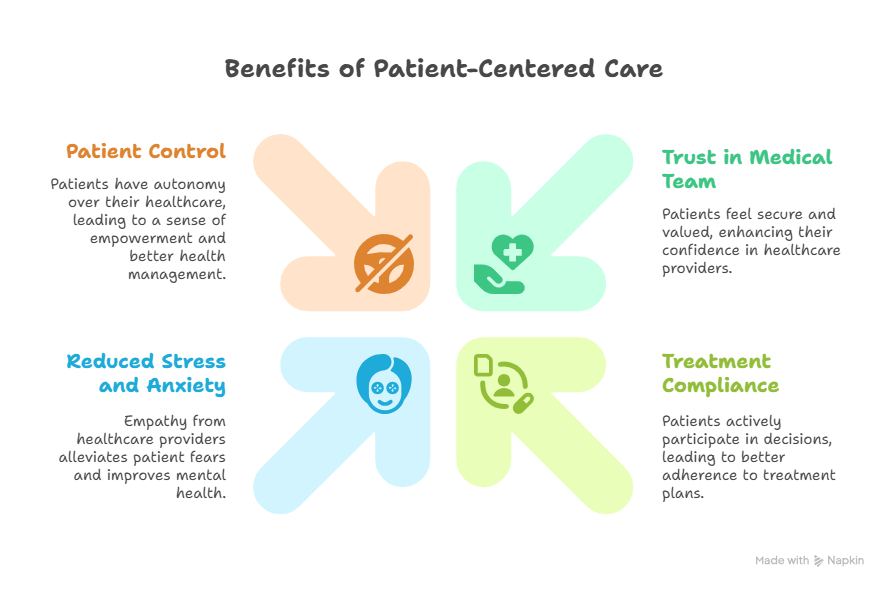Table of Contents
In the continuously changing environment of today’s healthcare system, the emphasis is no longer just on detecting and treating illnesses; rather, it is on treating the individual as a whole. Individuals are put at the center of the healthcare system via the implementation of this strategy, which is referred to as patient-centered care. The question “What’s the matter with you?” is replaced with “What matters to you?” as a result of this adjustment of viewpoint. The modern healthcare system is more than ever adopting this paradigm, as it has come to realize that providing treatment that is individualized to the requirements, preferences, and values of each individual patient results in improved experiences and outcomes.
Join Entri’s Hospital and Healthcare Administrator Course
What Is Patient-Centered Care?
A form of care known as patient-centered care (PCC) is one that acknowledges and takes into account the preferences, requirements, and values of each individual patient. Personalized care for patients (PCC) includes patients as active participants in their own health journey, as opposed to perceiving patients as passive beneficiaries of treatment.
Among the most important characters are
- Patients’ views and desires should be respected.
- Open lines of communication and collaborative decision-making
- Integrating and coordinating treatment for patients
- Sympathy and support for the emotions
- Participation of family members and attendants
- The provision of care that is both accessible and prompt
It is not enough to just care for the sick; it is also important to care for the patient.
What Are the Core Principles of Patient-Centered Care?
1: What is the primary role of a hospital administrator?
These are some of the guiding ideas that serve as the foundation for patient-centered care, which includes the following:
- Respect and Dignity—A feeling of respect and dignity is shown by professionals working in the healthcare business, who pay attention to and respect the perspectives of patients.
- Information Exchange—Information Exchange Providers engage in open communication with patients, providing them with the comprehensive information they need to make choices that are suitably informed.
- Participation—Playing an active part in the decision-making process about one’s medical treatment is something that is highly advocated to patients.
- Collaboration—Patients, their families, and the medical professionals who provide care for them are all required to work together at every level of treatment as part of the collaborative process.
- Holistic Care—It is not just the physical symptoms that are taken into consideration while providing holistic medical care; the emotional, mental, spiritual, and social well-being of the patient is also taken into mind.
Hospital Administration Course with Assured Career Growth
Hospital Administration Course by Entri App: Master essential healthcare management skills, gain certification, and secure top roles in leading hospitals
Join Now!What Are the Benefits of Patient-Centered Care for Patients?
When patients feel heard, respected, and engaged, trust and healthcare improve.
- Patients better comprehend their diagnosis, treatment choices, and care plans via two-way communication.
- Patients who engage in decision-making are more likely to follow therapy and lifestyle modifications.
- Emotional, mental, and social issues are included in patient-centered treatment, making patients feel supported.
- Personally tailored treatment improves symptom management, hospital visits, and health control.
- Respecting patients’ cultural, religious, and personal beliefs creates dignity and confidence in care management.
- Improved patient communication and participation may improve diagnosis accuracy and reduce errors.
- Patients get emotional and logistical assistance from family involvement in care choices.
Patients often say they are happier and have more control over their treatment when it is concentrated on them.
How Does Patient-Centered Care Improve Healthcare Outcomes?
Not only can patient-centered treatment make one feel good, but it also shows positive effects. According to studies, it results in:
- Reduced cases of problems and readmissions to the hospital
- Improvements in the treatment of chronic diseases
- A greater number of people receiving preventative care
- a decrease in the expenses of healthcare over time
- Relationships between patients and providers are stronger
PCC generates significant gains in health and system efficiency by concentrating on the individual rather than only the sickness and treating the individual as a whole.
What Is the Future of Patient-Centered Care in Modern Healthcare?
The patient-centered paradigm is associated with the future of healthcare, which aligns with personalization, digitalization, and interactive participation. We may anticipate the following:
- Personalization enabled by technology, including artificial intelligence and electronic health records
- The use of telemedicine and virtual care enhances accessibility and availability
- A greater emphasis on the utilization of patient input in the construction of healthcare delivery
- Integrated care teams consisting of medical professionals, nurses, counselors, and family members working together
- The therapy should place a primary emphasis on the patient’s mental and emotional well-being.
Care that is oriented on the patient is no longer a choice; rather, it is rapidly becoming the norm in contemporary healthcare systems all over the world.
Join Entri’s Hospital and Healthcare Administrator Course
Hospital Administration Course with Assured Career Growth
Hospital Administration Course by Entri App: Master essential healthcare management skills, gain certification, and secure top roles in leading hospitals
Join Now!Conclusion
More than just a paradigm for healthcare, patient-centered care is a mentality that completely alters the way in which treatment is provided. Through the process of concentrating on the specific values, interests, and requirements of each individual patient, this method fosters trust, enhances satisfaction, and ultimately results in improved health outcomes. The patient should be at the center of every choice that is made in the healthcare industry, since this is not just the ideal situation but also an absolute need. A healthcare system that is more compassionate, efficient, and prepared for the future may be created by adopting a patient-centered approach to care.
| Also Read |
Hospital Administration Course with Assured Career Growth
Hospital Administration Course by Entri App: Master essential healthcare management skills, gain certification, and secure top roles in leading hospitals
Join Now!Frequently Asked Questions
Can a healthcare worker practice PCC without formal training?
Yes, though training helps, any provider can begin by actively listening, showing empathy, and involving patients in decisions.
Which certification is better—Montessori or TTC?
It depends on your teaching philosophy. Montessori suits personalized, child-led learning, while TTC is ideal for structured, curriculum-focused teaching.
What are the benefits of Montessori certification?
It helps educators cater to individual learning styles and fosters independence, empathy, and creativity in children.
Is patient-centered care only used in private hospitals?
No, it’s being adopted in public and private healthcare settings worldwide as part of quality improvement.
Can family members be part of patient-centered care?
Absolutely. Involving families often improves outcomes and aligns care with the patient’s values.
Is technology compatible with patient-centered care?
Yes. Tools like patient portals, telemedicine, and mobile health apps enhance communication and personalize care.
Can patient-centered care be practiced in emergency settings?
Yes, by ensuring clear communication, respect, and quick decision-making in line with the patient’s preferences.












